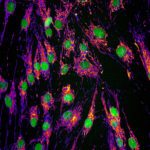Link to Pubmed [PMID] – 19029901
Nat. Genet. 2008 Dec;40(12):1484-8
In mammals, mitochondrial DNA (mtDNA) sequence variants are observed to segregate rapidly between generations despite the high mtDNA copy number in the oocyte. This has led to the concept of a genetic bottleneck for the transmission of mtDNA, but the mechanism remains contentious. Several studies have suggested that the bottleneck occurs during embryonic development, as a result of a marked reduction in germline mtDNA copy number. Mitotic segregation of mtDNAs during preimplantation, or during the expansion of primordial germ cells (PGCs) before they colonize the gonad, is thought to account for the increase in genotypic variance observed among mature oocytes from heteroplasmic mothers. This view has, however, been challenged by studies suggesting that the bottleneck occurs without a reduction in germline mtDNA content. To resolve this controversy, we measured mtDNA heteroplasmy and copy number in single germ cells isolated from heteroplasmic mice. By directly tracking the evolution of mtDNA genotypic variance during oogenesis, we show that the genetic bottleneck occurs during postnatal folliculogenesis and not during embryonic oogenesis.

